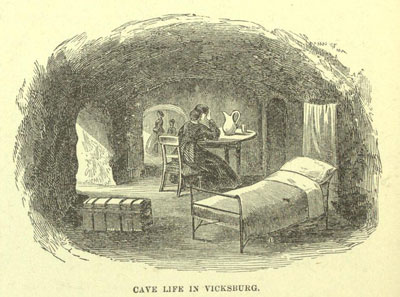
This illustration depicts the life in Vicksburg, MS, during the seige of 1863. Women and children moved into caves found throughout the city. The onslaught of a siege from the Union Army made homes uninhabitable. The cave occupants did have time to take some necessities with them, but life was far from pleasant during the constant shelling by both Union and Confederate armies. (NYPL)
What does the Declaration of Independence of the United States mean to you? Two hundred years ago, citizens in the North had faith in the unity of the nation. To Southerners it represented independence from foreign sovereignty with the promise of rebellion against any unjust government. For slaves and Abolitionists it was a hope for freedom.
During the Civil War (1861-1865) celebration of Independence was subdued if not totally ignored. However, two events on July 4, 1863 altered the future of our country forever. In late June General Robert E. Lee led his Army of Virginia on a strike against the Union Army on their own ground. Newly appointed General of the Potomac (US) George Meade learned of Confederate plans and began to move his men toward Lee’s Army. The two met at the small college town of Gettysburg, Pennsylvania. On the third day of intense fighting, with neither side clearly victorious, Lee began to move his men, able and wounded, south to Virginia. Immediately Meade retreated leaving the Gettysburg citizens, old men and women of all ages, to clean up the mess of the dead, men, horses and mules to bury.
Over 1,000 miles away in Vicksburg, Mississippi, citizens and Confederate soldiers had withstood a siege of 47 days. After trying every possible entry into the town of 5,000, Union General U. S. Grant decided to starve the Confederates and all civilians out of the strategically important point on the Mississippi River.
By the end of June, Confederate General John C. Pemberton realized he must surrender. Negotiations with Grant began. Grant wanted the surrender on July 4; Pemberton refused, asking for July 3rd. Grant finally convinced Pemberton that the July 4th surrender would have more impact on President Lincoln and his Cabinet. Pemberton did convince Grant not to press for an unconditional surrender as he had in the past. On the Fourth of July as Pemberton marched his bedraggled, starving army to surrender, a pall fell over the city.
For more than 81 years no Independence Day festivities were held in Vicksburg. July 4, 1945 was the exception. The United States and her allies had miserably defeated the Third Reich under Adolph Hitler. Victory in Japan was inevitable. Everyone in the United States was celebrating, including the good people of Vicksburg. They even celebrated on July 4, 1946, but gradually the event declined, again.
In the rural South the Fourth of July was rarely celebrated. Agricultural responsibilities in the busy summers allowed little frivolity. Flags were hung outside homes and stores, but life was definitely different on working farms.
Two other dates were clearly important to the nation. In addition to 1945 and the end of World War II Americans were jubilant on July 4, 1918 and July 4, 1976. In 1918 America was involved in a massive world war. Independence Day was an opportunity many American chose to show support for the U. S. Army, Navy, and Marine Corps serving in France.
The other time was July 4, 1976. The idea of celebrating America’s Independence and 200th Birthday seemed to have caught the attention of most Americans for weeks before. Festivities began on Flag Day in June. Flags flew constantly. Period costumes, patriotic music, and hundreds of parade goers let the world know how proud Americans were. How did you celebrate?
